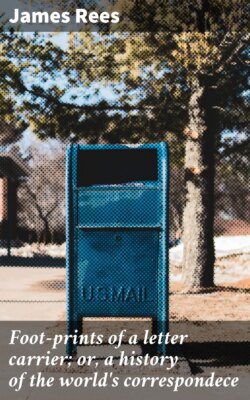Читать книгу Foot-prints of a letter carrier; or, a history of the world's correspondece - James Rees - Страница 8
На сайте Литреса книга снята с продажи.
PASTORAL LIFE.
ОглавлениеTable of Contents
“Nothing great, nothing useful, nothing high and ennobling, nothing worthy of man’s nature, of his lofty origin and ultimate exalted destiny has ever been accomplished but by toil; by diligent and well-directed effort, by the busy hand guided in its effort by the wise, thoughtful, hard-working brain.”—Anon.
When God said, “Let there be light: and there was light,” it was not the mere flash of the brightness of heaven over the earth, but a light that was to be as lasting as creation itself.
Every thing that sprung up from the earth in its order and beauty received the spirit of a new life from this holy and divine light. And when man in the image of his Maker stood in the Garden of Eden, there shone around him another light,—an emanation from God himself. Mind—intellect—power!
Man was the pioneer of the science of government. Deity planned it, and, as the crowning work of his creation, said:—
“Let us make man in our image, after our likeness: and let them have dominion over the fish of the sea, and over the fowl of the air, and over the cattle, and over all the earth, and over every creeping thing that creepeth upon the earth.”
As the earth became peopled the wants of man called forth all those energies requisite to sustain life by labor or otherwise; and these brought forth the mind’s attributes combined, and the world became a mirror reflecting Him who created it.
Pastoral life, in the early ages of the world’s history, afforded in itself the means of providing for the wants of man. This led to the cultivation of the soil and the raising of cattle.
Before the flood, Abel was a keeper of sheep, and Jabez was the father of such as dwell in tents and have cattle. Then came trades and professions. These led to art, art to science; and, as their numbers increased, they soon found that their sources from which they derived their subsistence—the spontaneous fruits of the earth and the flesh of wild animals killed in the chase—were insufficient to maintain them. Hence they were obliged to have recourse to other means. Property being established and ascertained, men began to exchange one rude commodity for another. While their wants and desires were confined within narrow bounds, they had no other idea of traffic but that of simple barter. The husbandman exchanged a part of his harvest for the cattle of the shepherd; the hunter gave the prey which he had caught at the chase for the honey and the fruits which his neighbor had gathered in the woods. Thus, commercial intercourse began and extended throughout the community. It reached still farther. It passed in its onward career from city to city, and from kingdom to kingdom, till at last it comprehended and united the remotest regions of the earth.
Then came trades and professions. These led to art, art to science, and science to the highest degree of knowledge the human mind is capable of attaining. Men became great: greatness led to power,—power to rule and govern. The combining of all these elementary steps led to the creation of kings, emperors, and lords. Then followed the division of classes. The phases of human intellect harmonized the whole system of rule, and men acknowledged in time the one great axiom, that “Knowledge is power.”
As language, writing, and writing-materials are all, more or less, connected with any subject identified with the welfare, the interest, and honor of a nation, as well as of mankind, they will not be considered out of place if alluded to here in connection with the subject of this work. First:—
